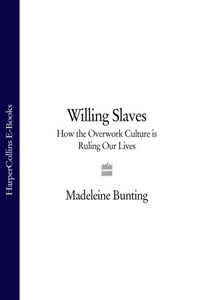The starting point for this book has been readers of my column in the Guardian. Whenever I touched on the subject of overwork, I would be overwhelmed by the volume and emotion of the emails I received in response. It was like a burst water main – a torrent of anger, bewilderment and sometimes despair. Here was a source of deep frustration beneath the surface which fitted awkwardly into the public space allocated to it in the national conversation. ‘Work-life balance’ was an inadequate label for the set of issues which stirred these passionate emails and letters. When I started researching the book, one of the first things I did was to set up a column on the Guardian’s website called ‘Working Lives’. I appealed to readers for their experiences, opinions and ideas on how things could change. The response was astonishing, as the emails poured in on every aspect of their work. Few of them, if any, could be put down merely to the sender’s grumbles about his or her job; I made a point of steering clear of individual injustices to focus on the mainstream. The underlying theme was the sheer invasive dominance of work in people’s lives, and the price it exacted on their health and happiness.
‘It’s not that I completely hate my job, it does have its good points. It’s just the amount of my valuable time that it takes up. Employers these days want blood, and if you’re not prepared to give it, you’re not part of the “team”. Our society should learn to relax more and stop working as slaves to the “economy”. It’s time to call a halt to this never-ending pursuit for more and more money. It’s time to reclaim our lives back from the so-called “employers” and it’s time to start living our lives as they should be lived, more life, less work,’ wrote a storeman in Hertfordshire.
His sentiments were echoed by an engineer who compared German and British working practices and concluded that the latter had ‘taught me that left to their own devices, companies will happily take your lifeblood’.
A civil servant from Yorkshire wrote that ‘I enjoy what I do and I work hard. But, and it is a growing but, I feel owned and more so every day. Due to all the mission statements, “values”, imposed ways of behaving and having to be always get-at-able (you must be accessible by mobile phone, must give an address when you are on leave, must leave a number when you are at meetings…) I feel that I have no privacy left.’
A woman in the oil industry in Scotland wrote, ‘Over the past ten years I have seen large companies continuously cut back on staff, whilst still expecting the same quality of work. Being thirty-something, our circle of friends are in a similar age group, starting families and suffering the same strain of long hours and not enough time with their families. Don’t get me wrong, I love my work. However, it takes such a toll on my family life that I have no choice but to seek a different career.’
A redundant banker decided not to try to find another job, because ‘Every week I hear similar stories of friends or friends of friends who, like me, worked sixty- or seventy-hour weeks, arrived home after dark each night, ate dinner and crawled into bed before getting up again the next morning whilst still dark to repeat the whole thing again, but who have now lost their jobs.’
A woman in advertising voiced what became a recurring theme when she wrote: ‘I feel that there is an expectation that work should be treated as a vocation, and that working hard is just not quite enough. But I don’t feel that my job is really that important (to society or to me) to really want to take on the extra and damage my home life. Not all of us have a vocation – what about those of us who want to do a good job, but want time to see partners, friends etc. after work?’
For a woman who had suffered a nervous breakdown because of the pressures of her job in television, ‘It is high time we re-evaluated our work ethic in this country – we are damaging ourselves and our children by not having the time or energy for caring, and trying to enrich our lives by buying more consumer goods only perpetuates the cycle…Where is it written that life should be endured, not enjoyed?’








